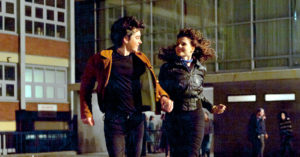
The gritty, back-breaking world of a vaquero doesn’t necessarily seem like the kind of narrative that would be pulsing with sensuality in every vein, but filmmaker Gabriel Mascaro makes it so with Neon Bull. It’s a curious film, grounded in reality with long takes and natural performances that follows Iremar (Juliano Cazarré) as he works at the Vaquejadas rodeo in Brazil, prepping and sending out bulls to be wrangled by show cowboys.
Iremar simultaneously works in the most masculine gig possible and obsessed with being a fashion designer, with his coworker Galega (Maeve Jinkings) as his main model. His walls are plastered in female bodies covered in all kinds of gowns and he even draws bikinis over the naked bodies in his coworkers’ porn magazine. None of the men in the film seem to be queer, but there’s a curious exploration of identity at play within this setting, and Mascaro’s presentation of bodies (both human and not) only emphasizes that. Nude bodies are showcased with complete and utter casualness, making the presentation of sex—particularly one unbroken take that lasts eight minutes from undressing to spooning after cumming—all the more arousing when it happens. It’s all presented with a little more grace and tenderness than raw, animalistic scenes tend to be.
For a work of art that features as much cow shit as it does, Mascaro frames every scene beautifully. Some focus on achieving a gorgeous symmetry, others to allow the audience to take in these landscapes that may not seem captivating at first but are made so through great cinematography. The quietude of the world is occasionally punctuated with striking, almost dreamy sequences that range from Galega wearing a horse mask and dancing to pounding electronica to a shirtless man running his hands over a horse’s body after he lulls it into submission.
These incredibly minor gestures are contrasted by a world in which performance is unnecessary, with every actor in this movie delivering their lines and duties with pure naturalism. Cazarré is, at all times, a compelling actor to be at the center of a film, in part because of his handsome looks, though this helps given the physical, dialogue-light nature of the role. Just as watchable are his supporting players, Jinkings and Alyne Santana (the young girl who plays her daughter Cacá) being the two offered the most material to explore. While it’s a little too light on characterization for its own good when it comes to everyone but Iremar, it’s interesting to see how Galega isn’t forced into the role of either mother or whore; she’s a truck-driver, an exotic dancer, and a woman just raising and teaching her child as best she can, all at once.
Through Iremar, Galega, and Cacá, Neon Bull also toys with the notion of not belonging within the world you’re in—a feature that emphasizes its potential queerness—even when everything in your world seems to function just fine on its own. The film doesn’t necessarily get anywhere or allow these ideas to come to fruition, but it’s also in part because it’s characters have no need to escape this micro-society. While some might fault it for never reaching concrete conclusions, there’s something special about this slice-of-life Gabriel Mascaro presents; it’s dirty, messy and often unfulfilling, but it’s home.
—
Directed by Gabriel Mascaro; written by Gabriel Mascaro; starring Juliano Cazarré, Maeve Jinkings, and Alyne Santana; 101 minutes.
Neon Bull is currently experiencing a limited theatrical release. In Miami, it will be receiving a one week engagement at the Tower Theater beginning on May 20th.



 Derek
Derek
 Isabelle
Isabelle